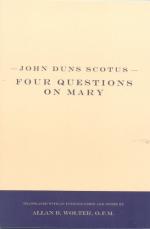|
This section contains 11,759 words (approx. 40 pages at 300 words per page) |

|
SOURCE: Ingham, Mary Elizabeth. “Scotus and the Moral Order.” American Catholic Philosophical Quarterly 67, no. 1 (winter 1993): 127-50.
In the following essay, Ingham evaluates Scotus as a moral philosopher and assesses his discussion of the moral life.
Twenty years ago, scholarship on Scotist thought centered upon the question: Is Scotus a voluntarist? Thanks to the serious research advanced by notable scholars,1 this question no longer preoccupies us. Scotus's “voluntarism,” if the term must be used, is not the radical advocacy of an indetermined will, but the reasoned presentation of a view of reality in which selfless love for the good, and not merely knowledge of the good, is the principal activity characteristic of human perfection.
What interests us today is the ethical model or paradigm which Scotus presents for moral activity. We seek to understand the workings of the intellect in mutuality with a will which is free for self-determination...
|
This section contains 11,759 words (approx. 40 pages at 300 words per page) |

|


